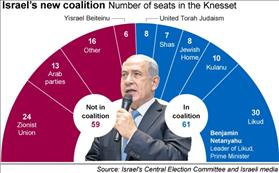Everyone is keeping silent; every silence has some vested interests
Israeli Left Must Internalize That ultra-Orthodox Parties Are Not Partners
How is it that the left-wing and center opposition factions hardly deal with issues of state and religion? Is the opposition again deluding itself that the ultra-Orthodox parties will reward it by forming a government with it?
Shahar Ilan 16/03/2016 12:40
Tags: coalition · haredi parties · left wing · government coalition

Israel's Government Coalition after 2015 elections
“Everyone is keeping silent. Every silence has some vested interests,” says former Internal Affairs and Culture and Sports Minister Ophir Pines-Paz of the Labor Party, referring to the silence that has descended on the opposition over the last year in matters of state and religion. “It’s wall-to-wall silence. I don’t think there has been such an extreme situation for years.”
According to Pines-Paz, Labor always believed that it would attain power in collaboration with the ultra-Orthodox parties. “That’s why they paid them so heavily all those years. Now [Yair] Lapid [head of the Yesh Atid party] too is keeping quiet since he wants to become prime minister [in other words, he’s hoping to collaborate with the religious parties]. The discourse has disappeared. The secular public has been abandoned. It has no representation in the Knesset.”
Pines-Paz led the state-religion struggle on behalf of the Labor Party for many years. Former MK Nitzan Horowitz did so for two terms as an MK on behalf of the left-wing Meretz party. Both of them have retired from politics.
“There has never been a Knesset such as this one,” says Horowitz. “Hundreds of thousands of people can’t marry. I hear of complaints about humiliating treatment and harassment [by religious authorities] and there is no response. The opposition has abandoned the battle and betrayed the trust placed in it by voters.”
What little discussion of freedom of religion there is in the Knesset is led by moderate religious MKs and not by secular ones.
“There are two main issues here,” says Horowitz. “The crucial point is that the struggle against religious coercion and for humane services for citizens in areas such as conversion and marriage is vital for a healthy society here. The political aspect of this is that this is an excellent topic for an election campaign. The opposition is not raising the banner in either of these aspects. It’s shooting itself in the foot.”
For many years Shimon Peres, who headed the Labor Party, invested in fostering good relations with the ultra-Orthodox parties. In the elections held in 1996, after the murder of Yitzhak Rabin, his partner in leading the party, Peres hoped that this investment would bear fruit. However the religious parties decided to support the young Likud candidate Benjamin Netanyahu and brought about his surprising victory. The defeated Peres referred to his endless investment in the ultra-Orthodox parties and its results: “They told me to cast my bread upon the waters and I sent whole bakeries.”
The left is adamantly refusing to internalize that lesson, that given a chance the ultra-Orthodox parties will always go with the right wing.
The cynics and the naïve are dreaming of an alternative coalition in which Labor chairman Isaac Herzog will replace Netanyahu. This is delusional.
“The cynics and the naïve are dreaming of an alternative coalition in which Labor chairman Isaac Herzog will replace Netanyahu. This is delusional,” says Pines-Paz. Horowitz uses similar words: “Anyone in the left-center who thinks that left-centrist parties can form a government together with the religious parties is deluding himself.”
The left and center now pursue a policy of avoiding any confrontation with ultra-Orthodox parties while directing all their fire at the settlers. This is so even as the ultra-Orthodox channel huge sums to seminaries for married men, which encourages them to remain outside the workforce, and to educational institutions in which children don’t learn core subjects such as mathematics and English. This is so even as they say awful things about Reform Movement Jews. This is so even when these parties have the exclusion of women at the center of their worldview.
The policy of disengagement from issues of state and religion, espoused by Labor, Meretz and Yesh Atid, is totally opposed to the position of their voters. The non-profit group Hiddush-For Religious Freedom and Equality, of which I am the deputy director, always reports the annual opinion poll conducted by the Smith Institute, which includes a “state and religion” index. In 2015, 100 percent of Meretz voters, 87 percent of Zionist Union voters and 85 percent of Yesh Atid voters said that all types of marriage should be recognized, including civil, Reform and Conservative. In addition, 86 percent of Zionist Union voters, 83 percent of Yesh Atid voters and 95 percent of Meretz voters said that they prefer a government without the ultra-Orthodox.
“I don’t understand the political logic of the opposition in this stance of not assailing the ultra-Orthodox,” says Horowitz. He claims that “one can collaborate with them on social issues but on others [state and religion], where hundreds of thousands suffer from injustice, supported by our voters, one shouldn’t hesitate to attack them. They laugh at us for being such wimps.”